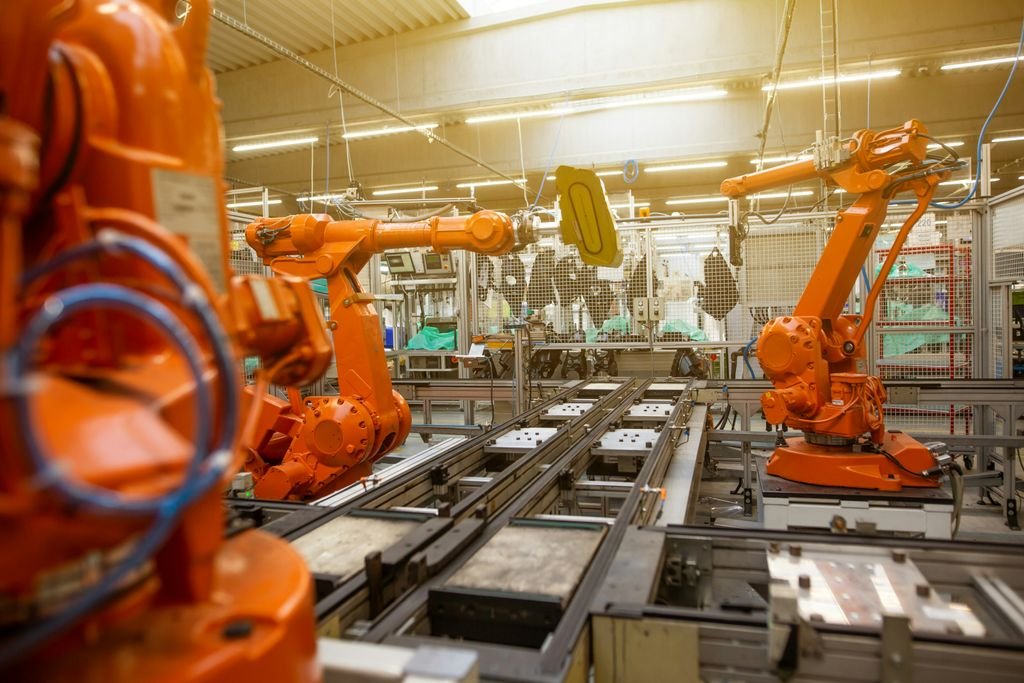The automotive industry is undergoing a revolutionary transformation with the integration of artificial intelligence (AI) in car manufacturing processes. AI has significantly impacted various aspects of production, design, engineering, and supply chain management, leading to advancements and innovations on the factory floor. This article explores the role of AI in car manufacturing and its impact on the automotive industry.
Key Takeaways
- AI is automating production processes in car manufacturing, leading to increased efficiency and productivity.
- AI is enhancing quality control measures, resulting in higher precision and consistency in the manufacturing of vehicles.
- AI is improving worker safety by implementing advanced safety protocols and monitoring systems in manufacturing facilities.
- AI-powered design and engineering are optimizing vehicle design and streamlining manufacturing processes, leading to innovative and efficient production methods.
- AI-enabled supply chain management is enabling predictive maintenance of machinery and efficient inventory management, enhancing overall operational efficiency in car manufacturing.
AI’s Role in Car Manufacturing
Automating Production Processes
The integration of AI in car manufacturing has led to a significant shift towards automating production processes. Robots equipped with AI algorithms are now commonplace on the factory floor, performing tasks with precision and efficiency that surpass human capabilities.
- Robotic Assembly: AI-driven robots handle complex assembly tasks, reducing the time and cost associated with manual labor.
- Painting and Welding: Advanced robots ensure consistent application and quality in painting and welding operations.
- Inspection: AI systems conduct real-time inspections, identifying defects that might be missed by the human eye.
The synergy between AI and robotics has not only accelerated production rates but also allowed for the customization of vehicles on a scale previously unattainable.
The table below highlights the impact of AI automation on production efficiency:
| Process | Before AI | After AI |
|---|---|---|
| Assembly Time | 30 hours | 24 hours |
| Defect Rate | 5% | 1% |
| Customization Options | Limited | Extensive |
This transformation is a testament to the power of AI in revolutionizing the automotive industry, paving the way for smarter, faster, and more adaptable manufacturing solutions.
Enhancing Quality Control
The integration of AI in quality control has revolutionized the way car manufacturers ensure the excellence of their vehicles. AI systems are now capable of detecting defects and inconsistencies with unprecedented precision, surpassing the capabilities of human inspection. These systems utilize advanced image recognition technologies to scrutinize every component, from the smallest screw to the entire chassis, for any imperfections.
- Real-time monitoring of production quality
- Automated defect recognition and classification
- Predictive analytics for potential quality issues
By leveraging machine learning algorithms, AI can predict and identify potential quality issues before they become problematic. This proactive approach to quality control not only saves time and resources but also significantly reduces the rate of manufacturing errors.
The benefits of AI in quality control are not just limited to defect detection. AI also contributes to the continuous improvement of manufacturing processes by providing detailed feedback and analytics. This data-driven insight enables manufacturers to refine their production methods, ensuring that each vehicle meets the highest standards of quality and craftsmanship.
Improving Worker Safety
The integration of AI in car manufacturing has led to significant improvements in worker safety. AI systems can predict and prevent potential accidents by analyzing data from various sensors on the factory floor. These systems can identify patterns that may lead to unsafe conditions and alert human operators before incidents occur.
- Real-time monitoring of environmental conditions
- Automated alerts for hazardous situations
- Predictive analytics for accident prevention
By leveraging AI, factories have seen a reduction in workplace accidents and an improvement in overall safety protocols. This proactive approach ensures that workers are less exposed to risks and can focus on more complex tasks that require human expertise.
AI also assists in ergonomic assessments, where it helps in designing workstations that minimize strain and injury. This has not only improved safety but also enhanced productivity, as workers are able to perform their tasks more comfortably and efficiently.
AI-Powered Design and Engineering
Optimizing Vehicle Design
The integration of AI in vehicle design has led to significant advancements in creating more efficient, safe, and consumer-friendly automobiles. AI algorithms can now predict how design changes affect a vehicle’s performance, leading to rapid prototyping and more informed decision-making.
- AI-driven simulations test various design aspects, from aerodynamics to safety features.
- Machine learning models analyze customer data to tailor designs to market demands.
- Generative design software explores countless design permutations to find optimal solutions.
By leveraging vast datasets and computing power, AI enables designers to transcend traditional design limitations, fostering innovation and functionality that align with evolving consumer expectations.
The use of AI in optimizing vehicle design not only enhances the aesthetic appeal but also contributes to the sustainability of vehicles by reducing waste during the production process and improving fuel efficiency through smarter designs.
Streamlining Manufacturing Processes
The integration of AI into car manufacturing processes has led to significant streamlining, making production more efficient and cost-effective. AI algorithms can predict and prevent bottlenecks, ensuring a smoother workflow and reducing downtime.
- AI systems analyze production data in real-time, allowing for immediate adjustments.
- Machine learning models optimize the scheduling of tasks to enhance productivity.
- Advanced robotics, guided by AI, perform complex tasks with precision, further streamlining the manufacturing process.
By leveraging AI, manufacturers can achieve a level of operational efficiency that was previously unattainable. This not only reduces waste but also accelerates the time-to-market for new vehicles.
AI-Enabled Supply Chain Management
Predictive Maintenance of Machinery
The integration of AI into the realm of supply chain management has been a game-changer, particularly with predictive maintenance of machinery. Predictive maintenance leverages AI algorithms to forecast equipment failures before they occur, allowing for timely interventions that minimize downtime and maintain production flow.
- Data Analysis: AI systems analyze historical and real-time data to detect anomalies.
- Maintenance Scheduling: Optimal maintenance schedules are generated, avoiding unnecessary checks.
- Cost Reduction: Predictive insights can significantly reduce maintenance costs.
By anticipating machinery needs, AI-driven predictive maintenance ensures a seamless manufacturing process, with the added benefit of extending the lifespan of critical equipment.
The impact of predictive maintenance is best illustrated through its ability to enhance operational efficiency. Facilities that adopt this technology report fewer unexpected breakdowns, leading to a more reliable production timeline and better resource allocation.
Efficient Inventory Management
The integration of AI in inventory management has revolutionized the way car manufacturers handle their stock. AI algorithms predict demand and supply fluctuations with high accuracy, ensuring that production never halts due to a shortage of parts. This predictive capability is critical in maintaining a lean inventory, reducing waste, and saving costs.
AI systems also facilitate real-time tracking of inventory levels, which allows for the automatic reordering of parts when stocks run low. This automation minimizes human error and enhances operational efficiency. Below is an example of how AI categorizes inventory needs based on various parameters:
| Parameter | Low Risk | Medium Risk | High Risk |
|---|---|---|---|
| Lead Time | > 1 month | 2 weeks – 1 month | < 2 weeks |
| Demand Predictability | Stable | Moderate Fluctuations | High Fluctuations |
| Supply Stability | Reliable Suppliers | Occasional Delays | Frequent Disruptions |
By leveraging AI, car manufacturers can dynamically adjust their inventory strategies, ensuring that the right parts are available at the right time, without overstocking or understocking.
Conclusion
In conclusion, the impact of AI on the automotive industry is undeniable. The advancements and innovations in car manufacturing driven by artificial intelligence have transformed the factory floor, leading to increased efficiency, precision, and quality. As we continue to witness the AI revolution in car manufacturing, it is clear that the future holds even more exciting developments and possibilities. The integration of AI technologies has not only improved the production process but has also paved the way for new features and capabilities in modern vehicles. The automotive industry is at the forefront of embracing AI, and the journey towards smarter, more automated, and sustainable manufacturing practices is well underway.
Frequently Asked Questions
How is AI transforming car manufacturing processes?
AI is automating production processes, enhancing quality control, and improving worker safety in car manufacturing, leading to increased efficiency and productivity.
What role does AI play in vehicle design and engineering?
AI optimizes vehicle design and streamlines manufacturing processes by analyzing data and generating innovative solutions for design and production.
How does AI-enabled supply chain management benefit car manufacturing?
AI-enabled supply chain management offers predictive maintenance of machinery and efficient inventory management, ensuring smooth operations and reduced downtime.
What impact does AI have on the automotive industry?
AI is revolutionizing car manufacturing and features, bringing significant advancements in production, design, engineering, and supply chain management.
How does AI enhance quality control in car manufacturing?
AI employs advanced algorithms and sensors to detect defects, monitor production processes, and ensure high-quality standards in car manufacturing.
What are the safety benefits of AI in car manufacturing?
AI improves worker safety by implementing automation, predictive maintenance, and real-time monitoring of manufacturing equipment, reducing the risk of accidents and injuries.





